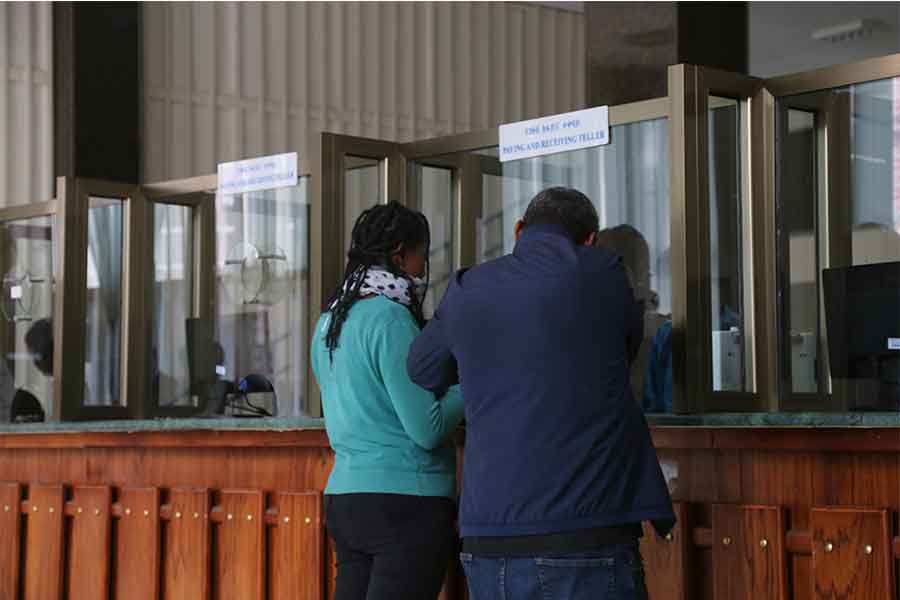
Fortune News | Apr 16,2022
Belay Kahsay, 84 years old and the father of four daughters, served as a finance officer until his retirement from Agip - an Italian gasoline, diesel and lubricants retailer.
Two years ago, Belay went to a hospital after getting sick. A urine test revealed his illness as gout arthritis, a disease that leaves patients with joints permanently damaged and swollen. Since then, his upper body has weakened, and he now requires close assistance from his relatives.
Belay uses a wheelchair to move around and needs someone to help him eat and talk to him. Ruth, one of his daughters, is his main caretaker.
Though Ruth is there for her father, she came to need someone's help in caring for him. So she started searching for someone who could dedicate their time to taking care of Belay. A nurse friend finally told her about home care service providers.
Two years ago, she ended up hiring Fikir Home Care Service Provider, a company that was established three years ago to provide healthcare services for those needing moderate care after leaving the hospital.
The company dedicated Zewdu Baykedagne, a caretaker, to take care of Belay. He goes to the client's home every morning at 8:00am and leaves late in the afternoon at 6:00pm.
"It's important we have Zewdu around to help us," she said. "He is so giving of his time and energy.”
Zewdu, who has been with the family and Fikir Home Care Sevice Provider for two and three years, respectively, was initially a healthcare extension worker.
"It has always been my passion to care for those who can't help themselves," says Zewdu. "I can't imagine there's a better calling."
Zewdu helps the family give Belay a shower, serves him his meals and talks to him as well. After hiring a home care provider, Ruth's life has been made easier, and her father is receiving better care.
Even though home-based healthcare services have been available for years, they have not been widely adopted and institutionalised. However, the service was better formalised after the issuance of a directive by the Ministry of Health in 2015. The directive defines home-based services as focused on relieving symptoms and supporting patients through physical, emotional or spiritual illnesses.
The directive indicates that service providers may look after terminally ill patients, provide long-term care for chronically ill patients or give palliative care.
Nebiyat Demeke (left), founder and general manager at Rohobot Home-based Healthcare Service, awaits calls from current and tentative customers.
So far, 11 companies are registered in the capital to provide the service, Fikir being one of them. The business employs 35 people, 10 of which are permanent. It provides training for those in the field as well.
Fikir can have anywhere from 10 to 15 patients at a time. It charges anywhere between 200 to 800 Br a day based on the services and the hours of care the customers require.
“It’s not a very profitable business," says Alemu Kibret, coordinator at Fikir, "but more people are becoming aware of it, therefore, we are sure it's going to grow."
Rohobot Home-based Health Care Service, one of the prominent home care providers in the city, is another business that has provided the service since 2017. Rohobot has 37 employees including administrative staff.
Many of the patients are stroke patients unable to move or require oxygen support, depending on where the stroke hit and to what degree, says Nebiyat Demeke, founder and general manager at Rohobot.
Rohobot, which has 10 to 12 patients at any time, like others in the business also provides other facilities such as hospital beds, wheelchairs, suction machines and other essential equipment that patients may need.
“Some of our patients can’t afford these services, thus we don’t push. But every patient has a follow-up sheet, and this is a basic service we provide,” says Nebiyat. “Almost all of our staff are nurses, but we have one doctor as well.”
The directive issued by the Ministry of Health requires home-based healthcare providers to produce staffing information and complete facility checks and other requirements before they are licensed.
Even though the business should be able to operate successfully after the companies are provided with licenses, there are a few companies that operate informally, according to Nebiyat.
“The government has taken no actions to control this," says Nebiyat, "so it makes me wonder exactly what are the benefits of having a license."
Debrework Getachew, deputy director of the Medicine Registration & Licensing Bureau in Addis Abeba, says that they have not received any complaints on this issue and that the home care service providers should take on this responsibility.
Mikias Yafet, general manager of Tirita Home Health Care Service, another prominent firm in the sector, stressed the need for companies to become registered since they are accountable for their services.
"The activities of those that work informally cannot be documented properly," he says. “Doing this business informally is obviously more profitable, since the service providers have no costs."
Nebiyat says the Novel Coronavirus (COVID-19) has greatly affected their business.
“Our business has been one of the hardest hit," she says. "We lost over half of our client and hence had to let go of some of our staff. We had over 60 employees before COVID-19.”
Clients stopped using the service, because many did not want to risk service providers bringing the virus home, according to her.
“We understand their concern," says Nebiyat, "especially considering our clients already have underlying illnesses."
Patients for Fikir Home Care Service providers have been driving their service providers to and from work to help them avoid being exposed to the virus by using public transport.
Rohobot Home-based Health Care Service has also started providing transportation services for its employees to and from patients' homes.
As a means of generating revenue and covering its costs, Rohobot started selling gloves, hand sanitiser and face masks, according to Nebiyat.
“We understand this is a national crisis, and we don’t want to push the costs onto our clients,” she said.
Debrework admits that some home-based healthcare providers have been closing their doors since the start of the pandemic.
After the virus was reported in Ethiopia in mid-March, a total of four companies closed their doors after returning their business licenses.
“Many companies joined the service and leave shortly after, but it seems the pandemic is affecting their activity," he said. “We believe the needs of the service have been met, but many of them need to do a better job of promoting their businesses."
Mikiyas says another major issue is the fact that home-based healthcare services are not included in the referral system.
“This is why we don’t believe the directive put in place is well-tailored,” he says.
Home care health service providers take care of patients who no longer need hospital care, thus it would make sense for hospitals to inform patients of these companies, according to Nebiyat.
"Our clients usually come through word-of-mouth recommendations,” she says.
Recently, the Ministry of Health has issued a manual that enables private healthcare providers to engage with COVID-19 treatment. Home-based healthcare providers can monitor asymptomatic patients or patients with mild symptoms. The Ministry capped the daily fee for the home-based service at 700 Br.
Worku Tuffa (PhD), assistant professor of business, entrepreneurship & development at the College of Development Studies in Addis Abeba University, says that the sector should be eyed as an important tool in reducing overcrowding in hospitals.
“This business can also reduce the amount of time patients stay in hospitals for recuperation and make way for patients that need it more urgently,” he says.
“In addition, many people don’t go to hospitals by choice, and it's human nature to prefer familiar environments. Therefore, we can assume most would prefer care in the home rather than hospitals," he says. “This business has major social benefits.”
There are many people, especially in the city, who can afford this type of specialised care, according to Worku.
Mikiyas of Tirita Home Health Care says that they are expecting to get more requests to follow up with COVID-19 patients, but the government needs to make PPE and other equipment more available.
Debrwork confirmed to Fortunethat none of the 11 licensed providers have formally been asked to take on COVID-19 treatment. However, two new service providers have submitted requests to provide home healthcare services for patients that have the virus.
Fikir, on the other hand, has not decided if his company wants to work on COVID-19 care.
“We’re not quite sure what kind of guarantee we can offer our employees if they start treating COVID-19 patients,” Alemu said. "But we've had some requests to deliver food items to patients at home. We are trying to support them the best we can.”
PUBLISHED ON
Aug 22,2020 [ VOL
21 , NO
1060]

Fortune News | Apr 16,2022

Fortune News | May 26,2021

Featured | Jul 13,2019

Fortune News | Oct 03,2020

Radar | Oct 05,2024

Viewpoints | Oct 03,2020

Viewpoints | Jan 09,2021

Fortune News | Jul 18,2021

Fortune News | Aug 07,2021

Commentaries | Jun 08,2019

Dec 22 , 2024 . By TIZITA SHEWAFERAW
Charged with transforming colossal state-owned enterprises into modern and competitiv...

Aug 18 , 2024 . By AKSAH ITALO
Although predictable Yonas Zerihun's job in the ride-hailing service is not immune to...

Jul 28 , 2024 . By TIZITA SHEWAFERAW
Unhabitual, perhaps too many, Samuel Gebreyohannes, 38, used to occasionally enjoy a couple of beers at breakfast. However, he recently swit...

Jul 13 , 2024 . By AKSAH ITALO
Investors who rely on tractors, trucks, and field vehicles for commuting, transporting commodities, and f...

Oct 11 , 2025
Ladislas Farago, a roving Associated Press (AP) correspondent, arrived in Ethiopia in...

Oct 4 , 2025
Eyob Tekalegn (PhD) had been in the Governor's chair for only weeks when, on Septembe...

Sep 27 , 2025
Four years into an experiment with “shock therapy” in education, the national moo...

Sep 20 , 2025
Getachew Reda's return to the national stage was always going to stir attention. Once...